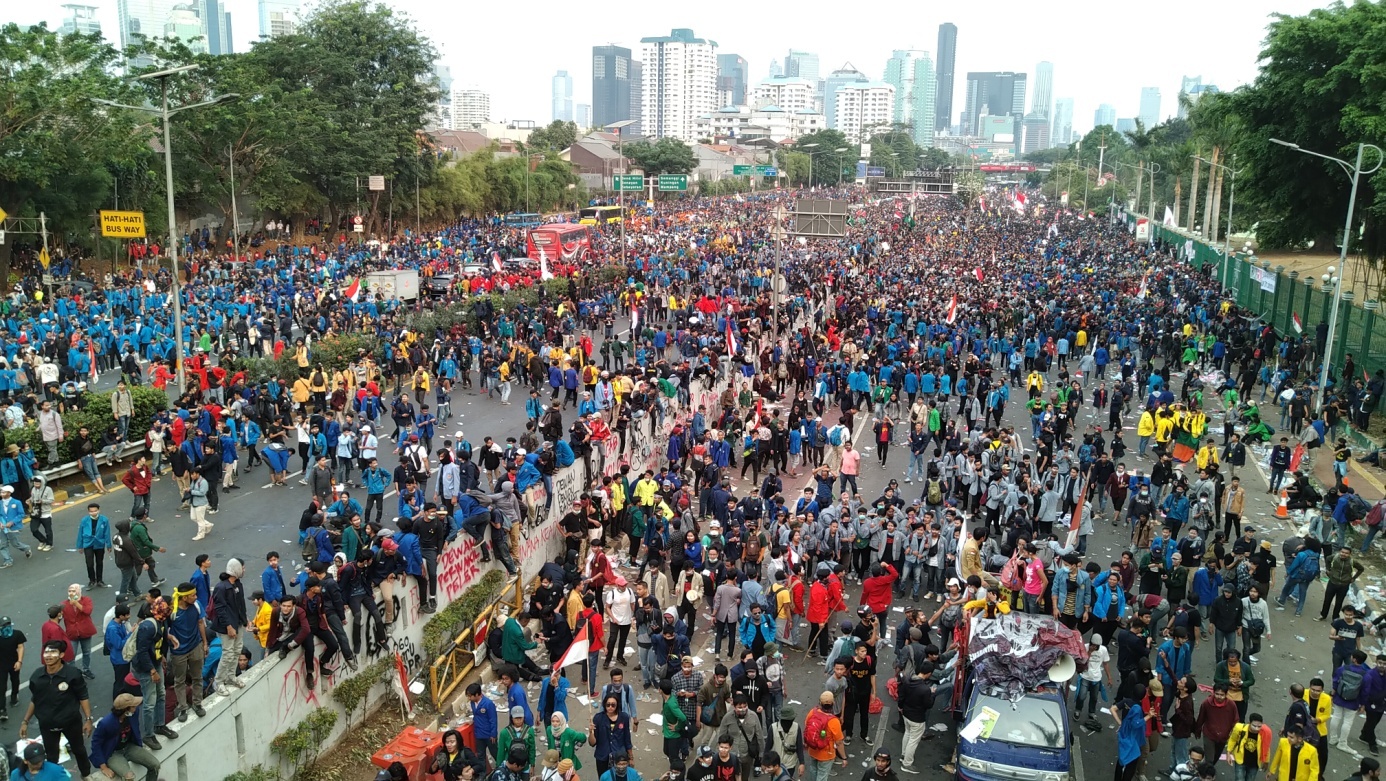Curing Indonesia’s collective amnesia
That exact hour when angry students took over the parliamentary building in Senayan, Jakarta, I was over 10.000 kilometers away. In 1998, the six-year-old me moved to Göttingen, Germany, to accompany my mom who won a scholarship to do her master’s there. I vaguely remember seeing clips on the television or in the newspaper my dad brought home that week, but at that age I could barely make sense of what happened. What New Order? An analysis by Andhyta F. Utami, co-initiator of BijakMemilih.id and founder of Think Policy Society.
Two decades later on 26 September 2019, when the next generation of angry students barged in again to the House of Representatives, I was less than 5 km away. At this point I already received six years of higher education on politics and public policy – I was supposed to know better.
I guess I was somewhat aware about the problematic law passed the week before that would effectively weaken the Corruption Eradication Commission (KPK), and how the proposed changes in the country’s criminal code would limit civic freedom.
Yet, there I was, working late in my comfortable office in the Sudirman Central Business District (SCBD), low-key virtue signalling on Twitter without really doing anything. What reformasi dikorupsi (reformation corrupted)? I later learned that the violence led to the death of five activists. Even then I was not sure if I could have done anything that would matter.

I decided to join a protest
Let me take you back to the midpoint year of 2008 when, a little after dhahur (noon prayer) another group of angry students walked to the principal’s office of my high school. For the first time in my life, I decided to join a protest; I decided that I cared about this issue more than my grades. We demanded the administration to address the significant pay-gap between local and international teachers, which led to the resignation of our favourite biology teacher Miss Thea (not her real name).
While we failed to keep her, I learned that the adults who built the World around me did not always know better. I realized that I did not have to always accept the status quo and allowed to demand better.
Collective amnesia
At the risk of oversimplifying, what is happening to us today is collective amnesia. Essentially, thanks to 32 years of being under an autocracy, we never had the chance to train our muscles in practicing democracy, in holding those in power accountable.
The rise of Soeharto came with the erasure of the intellectuals and activists critical to the ruling government – disappeared, murdered, and exiled. Just as natural science became state-sponsored throughout pre-1945 colonialism (read Andrew Goss’s The Floracrats), post-1965 social science virtually became a tool to control the masses.

Millions of students, yours truly included, went through a curriculum designed not to train critical thinking, let alone civic education, but to strengthen a narrowly defined ‘nationalism’.
We were taught to understand colonization and the struggle for independence so we could appreciate it, to memorize the five silas and patriotic songs, but we were not given the tools to question the state or participate meaningfully in politics.
Our students were not encouraged to doubt, to solve the problems around them, to feel comfortable navigating different ideas and to question authority figures.
The past quarter-century was supposed to be about catching up, except that the subsequent regimes seem to have benefitted from not making it a priority.
Seven years ago, only four months after I began my studies in the United States, I woke up to my Twitter timeline exploding with news of Donald Trump’s victory over Hillary Clinton.
Almost every other week after, I witnessed my middle (if not upper-middle) class, privileged friends protesting on the streets and in public parks about Trump’s policies they have objections to. From immigration to climate change, they would invest their time and energy to make sure their voices were heard. Their democracy is not perfect either of course, but this ‘we simply do not know any other way’ mindset deeply inspired me.

Our educated middle class is not yet fluent in democracy
Here in Indonesia, our educated middle class is not yet fluent in democracy. With a few recent exceptions (read: the Free Palestine rally on 5 November 2023) the majority of middle-class adults in Indonesia tend to view protests as a waste of time. Participating in one means you do not have anything better to do, and most of the impact you would create is unnecessary traffic.
Meanwhile the younger cohort of voters are distracted by the content overload from every possible corner, they could hardly zoom out to see the bigger picture. It would not surprise me if they end up in voting based on which gimmick attracts them the most and if that happens, the blame may not be entirely on them.
The rampant pessimism is dangerous and a self-fulfilling prophecy. It is easy to withdraw, it is much more difficult to choose hope, to entertain the possibility that politics could be fixed. I am hereby pleading that we owe it to ourselves to at least try.
‘3,5 percent rule’
A paper published by Harvard University introduced the ‘3,5 percent rule’ – it contends that when a small minority begins to take action, they never fail to change the outcome.
If I’m being honest, it sounded too optimistic: that nonviolent protests are twice as likely to succeed as armed conflicts did not seem realistic to me.
But the examples were worth looking into: the 1986 People Power movement in the Philippines folded the Marcos regime on the fourth day, Eduard Shevarnadze of Georgia was ousted in 2003 through the bloodless Rose Revolution, and presidents of Sudan and Algeria announced resignation in 2019 after peaceful campaigns of resistance.
In Indonesia, this translates to creating a critical mass of roughly 10 million people who cared enough to engage meaningfully in democracy – voting as a start, and speaking up through protests for the following five years after. Can we get there? Let’s do the math.
We have over 110 million middle-class Indonesians today, with almost 80 percent of the country having access to the internet and 52 percent of the voters under 40. A majority of them lives in cities.
Out of this number, our BijakMemilih.id website has observed an exponential growth of unique users from 3.000 to 300.000 in the past few months alone. We are still far from the goal, but this is not a number we could dismiss.
Here’s to hoping that when the next generation of angry students march on the streets, 3,5 percent of this country will be ready to join behind them. Even better, here’s to hoping that we do not have to go there in the first place because we finally educate ourselves, move together and demand better from our political system.
Andhyta F. Utami
Dit stuk verscheen in de Jakarta Post, January 2024 / Choices and Chances

Andhyta Firselly Utami or Afu is an environmental economist with the World Bank based in Jakarta, where she provides analytical and advisory support to the government of Indonesia on issues related to sustainability and climate goals. She graduated with a Master in Public Policy from Harvard University and has a bachelor’s degree from Universitas Indonesia.
She also initiated Think Policy Society, a network of young professionals that promotes an analytical mindset towards better policymaking in Indonesia, and Frame & Sentences, a video essay series on YouTube that nurtures critical thinking through discussions on political and social issues.
Lees verder (inhoud februari 2024)




